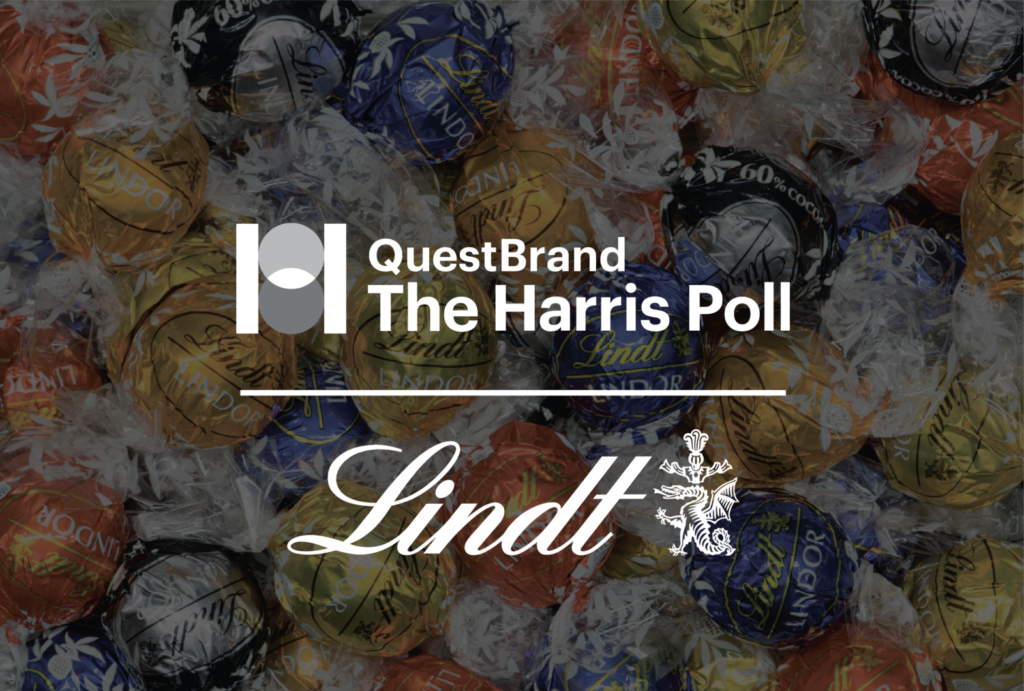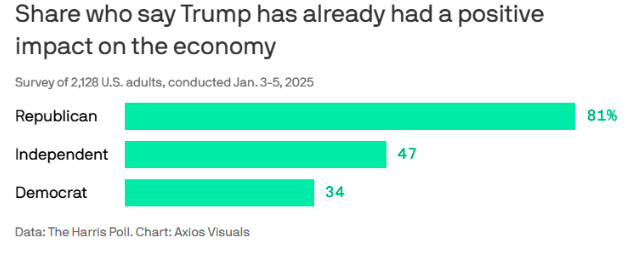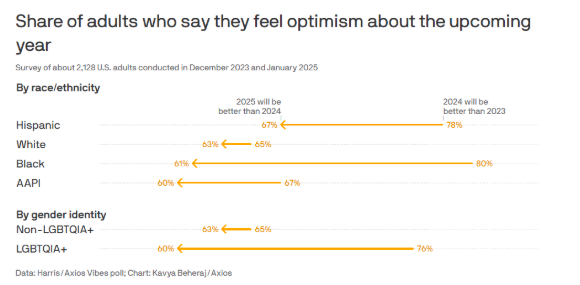Brief • 4 min Read
Live From Davos: Upskilling Surges, Business Confidence Wanes, Trump Retakes Office and C-Suite’s Childcare Blindspot.
The latest trends in society and culture from The Harris Poll
Can an incoming President impact the economy before taking office? Our Axios Vibes by The Harris Poll found that half of Americans (53%) credited the President for improving the economy since being elected. The catch is that we fielded this study January 3-5.
We have four new stories this week:
- We are live from Davos, where we launched our new ETS Human Progress Report and the latest “fear” – FOBO, the fear of being obsolete.
- Also, from #WEF, we shared troubling disconnects between citizens and global business in our latest Business Confidence Index with Page Society.
- This week, in our Axios Vibes by The Harris Poll, we surveyed how various parts of American society are bracing for its impacts.
- In new research with KinderCare, C-suites fail to listen to their HR regarding employer childcare benefits.
2025 Is All About Upskilling: ETS-Harris Poll
This week, our second annual ETS Human Progress Report was launched at the World Economic Forum’s Annual Meeting in Davos. With over 18,000 respondents across 18 countries – it explores how reskilling and upskilling are fast becoming normalized global career strategies. Among the trends, we uncovered:
- The fear of being obsolete (FOBO): (60%) of employees have anxiety about their professional relevance due to the accelerating pace of technological change.
- Yet more than three in five people globally feel optimistic about their country’s upskilling/reskilling opportunities today (63%) and by 2035 (65%).
- Upskilling = career advancement: Most global employees (86%) agree that certifying their skills improves their chances of securing a better or higher-paying job, improving their career trajectory overall.
- Showcasing your value will change: Globally, by 2030, over six in ten people expect a world of verified resumes and digital skill wallets to showcase their value to the workplace.
Takeaway: “The world stands at an inflection point where human skills are redefined, changing what it means to learn and prosper through considerable and dynamic change,” writes Amit Sevak, CEO of ETS. “In 2025, success belongs to those who can adapt. The ability to adapt, to be resilient, and to collaborate effectively is no longer a preference in the world of work – it’s a necessity.”
Business Confidence Wanes In 2025: Page Society-Harris Poll
Our latest Business Confidence Index with the Page Society, launched at WEF this week, examines the importance of 16 societal issues across 14 countries and the degree to which people have confidence in businesses’ ability to impact them positively. Key findings:
- There’s a substantial gap in global confidence in business: Only (26%) globally are confident that leading companies can positively impact societal issues.
- There’s even a 25%-pt gap between the public ranking of and confidence in addressing the most critical issues: 1.) Economic stability and growth, 2.) Job creation and workforce skills development, 3.) Corruption, 4.) Environment 5.) Research and technological innovation, and 6.) Mental health issues.
- The top 2025 business risks, according to CCOs, are: 1.) Anti-woke/Resistance to ESG/DEI: activist pressure campaigns and reputational risk; 2.) Polarization & Low Trust: Ideological divide, dis/misinformation, fractured media landscape, declining faith in institutions; 3.) Trump Policy Shifts: Economic, regulatory, and foreign policy changes; and 4.) Geopolitical Challenges: Rising populism, instability, and international conflicts.
Takeaway: The CCO is called upon more now than ever to provide leadership in navigating a complex and rapidly evolving stakeholder landscape. The results provide a window into how organizations can identify high-priority issues and how the perception of these issues can shift across geography, age, and political leanings. Some CEOs are even setting up war rooms, according to the WSJ.
Optimism Declines Among Some Minority Groups: Axios Vibes By The Harris Poll
In our latest Axios Vibes By The Harris Poll, optimism for the year ahead has dropped significantly among people of color, LGBTQ+ Americans, and many women as President-elect Trump returns to the White House.
- By the numbers: (63%) of Americans said 2025 would be better than 2024, barely changed from Dec. 2023 (66%).
- But optimism dropped among Black (80% to 61%), Hispanic (78% to 67%), LGBTQIA+ Americans (76% to 60%), and women (65% to 58% v. men: 68% from 67%).
- Reality check: Many of these minority groups, especially Latinos, voted for Trump.
- Zoom in: (63%) of LGBTQIA+ respondents, (57%) of AAPI and Black Americans, and (55%) of Latinos say they’re concerned about their safety. In comparison, (64%) of Black and (61%) of LGBTQIA+ Americans cite concerns about their civil rights.
Takeaway: “The disparities between demographic groups in terms of how they’re feeling heading into 2025 reflect that while Trump’s return fills some Americans with hope, many others are deeply concerned,” writes Axios’ Russell Contreras and Margaret Talev. It’s clear from the data that there are groups within America who worry the new administration’s potential policies will directly impact their lives.
Convincing The C-Suite On Childcare: Kindercare-Harris Poll
As more executives call workers back to the office, employees are increasingly under pressure to figure out their childcare plans. HR leaders are tasked with advocating for workers to get the benefits they need, but our new research with Kindercare, featured in HR Dive and Fortune, shows just how difficult it is to convince the C-suite.
- A staggering (78%) of Fortune 500 HR leaders say they’ve had difficulty persuading the C-suite of the long-term investment benefits of providing childcare to employees.
- However, HR teams believe in these benefits and their ability to make employees’ lives easier: (83%) agree that childcare benefits improve employee mental health, and (82%) say they can offset the negative impacts of return-to-office mandates.
- But, there are disconnects between what HR wants and what the C-suite is willing to provide: (71%) said that management doesn’t comprehend just how much quality child care boosts productivity for working parents, and another (70%) wish they could remind managers that “employees have families.”
Takeaway: “Some CEOs are likely betting that all this pushback against returning to the office will die down, but I think this issue, childcare included, will certainly continue through 2025 and into 2026. Because people are still figuring out the effects of RTO, and companies that help their workers the most will succeed first,” Dan Figurski, President of KinderCare for Employers and Champions, tells Fortune.
Subscribe for more Insights
Subscribe to our newsletter for the latest trends in business, politics, culture, and more.
Related Content











